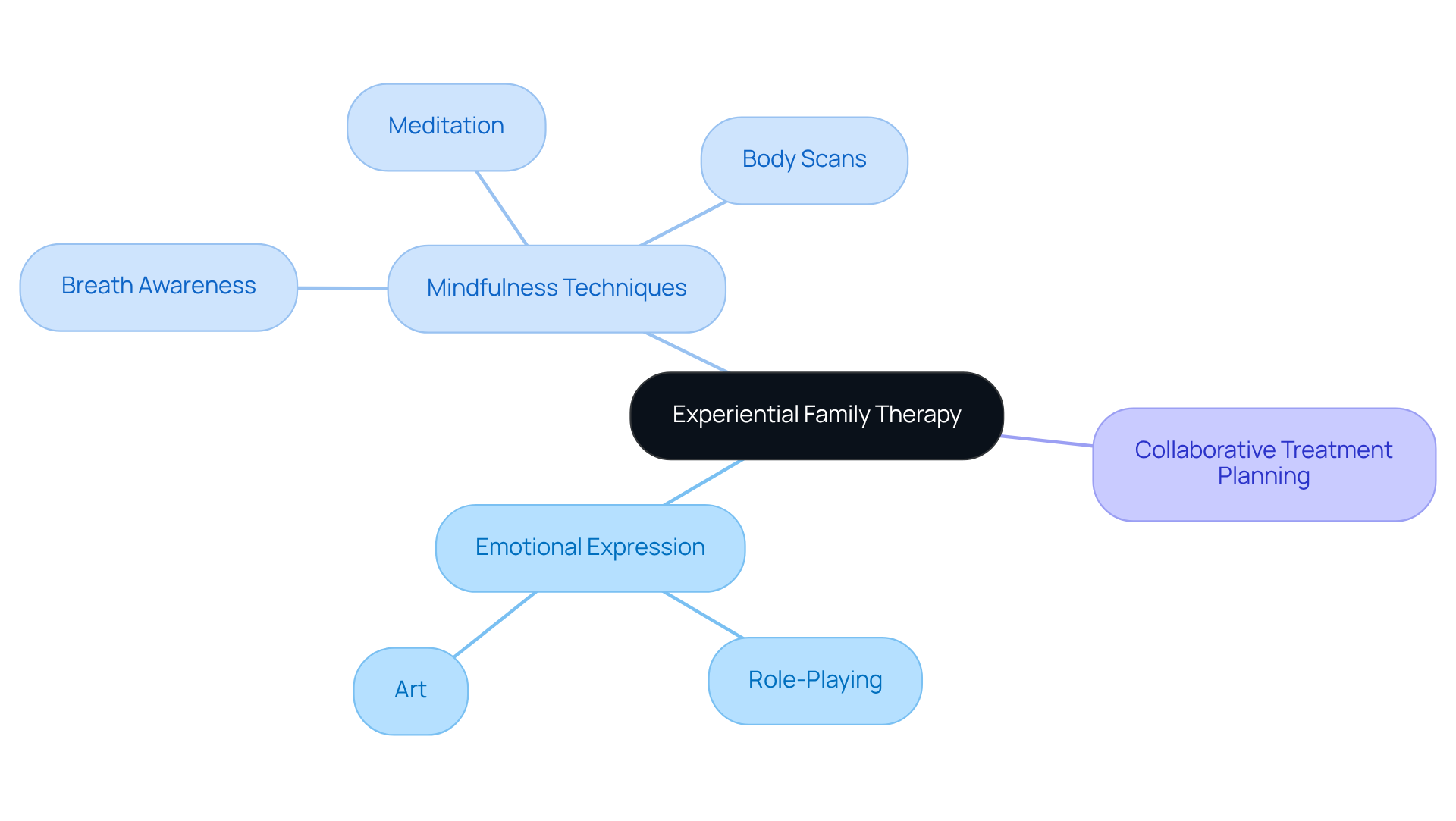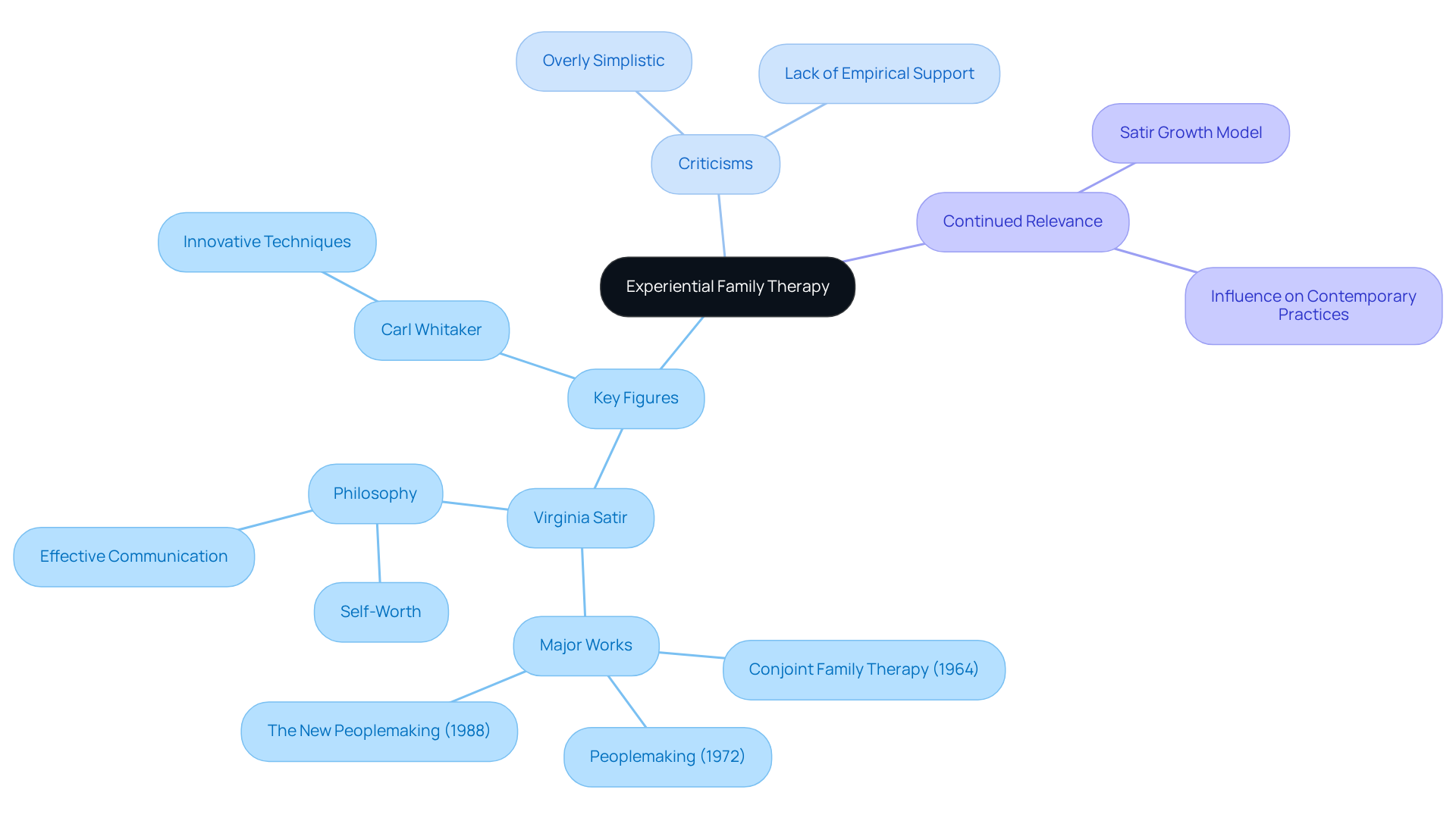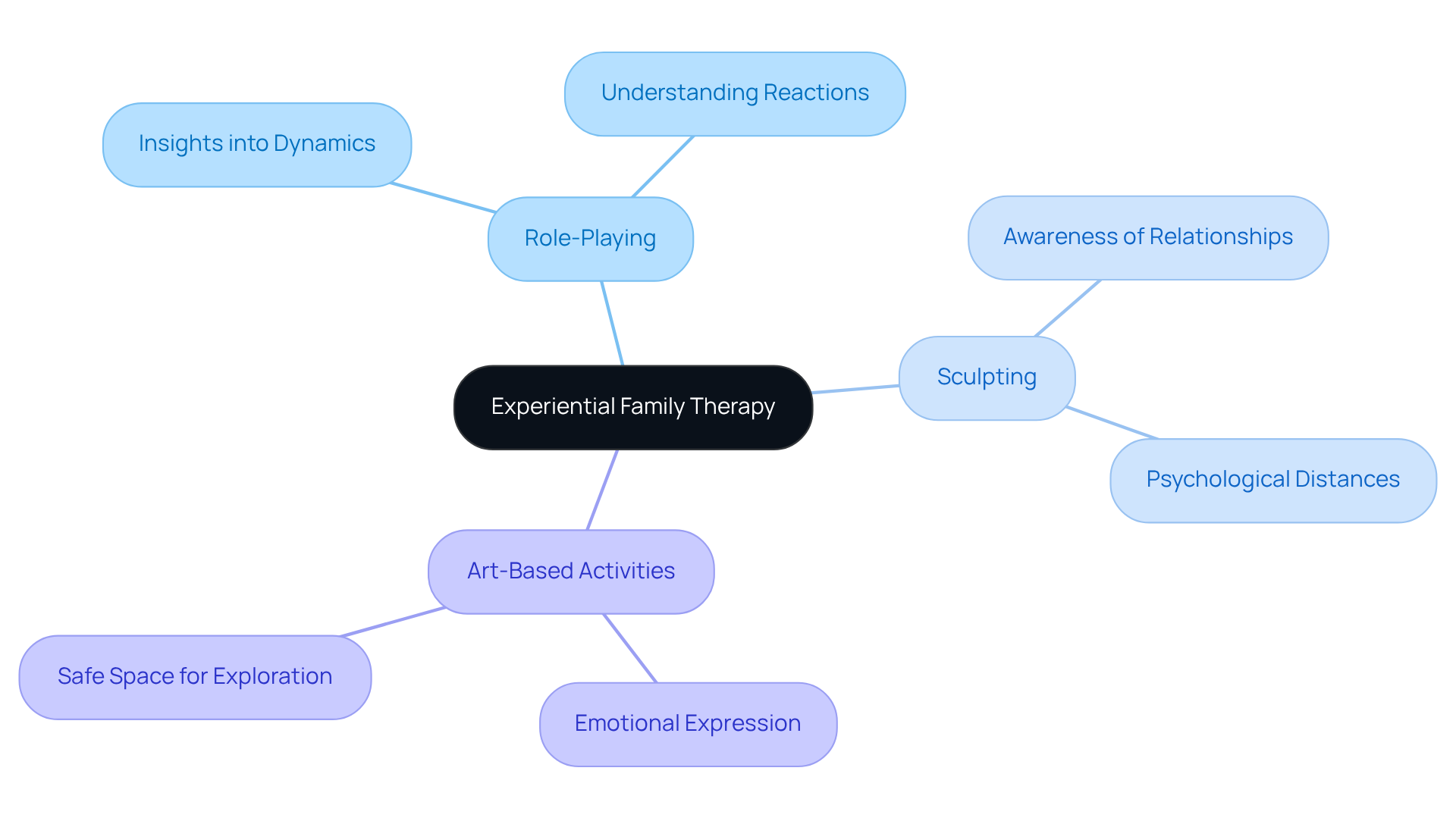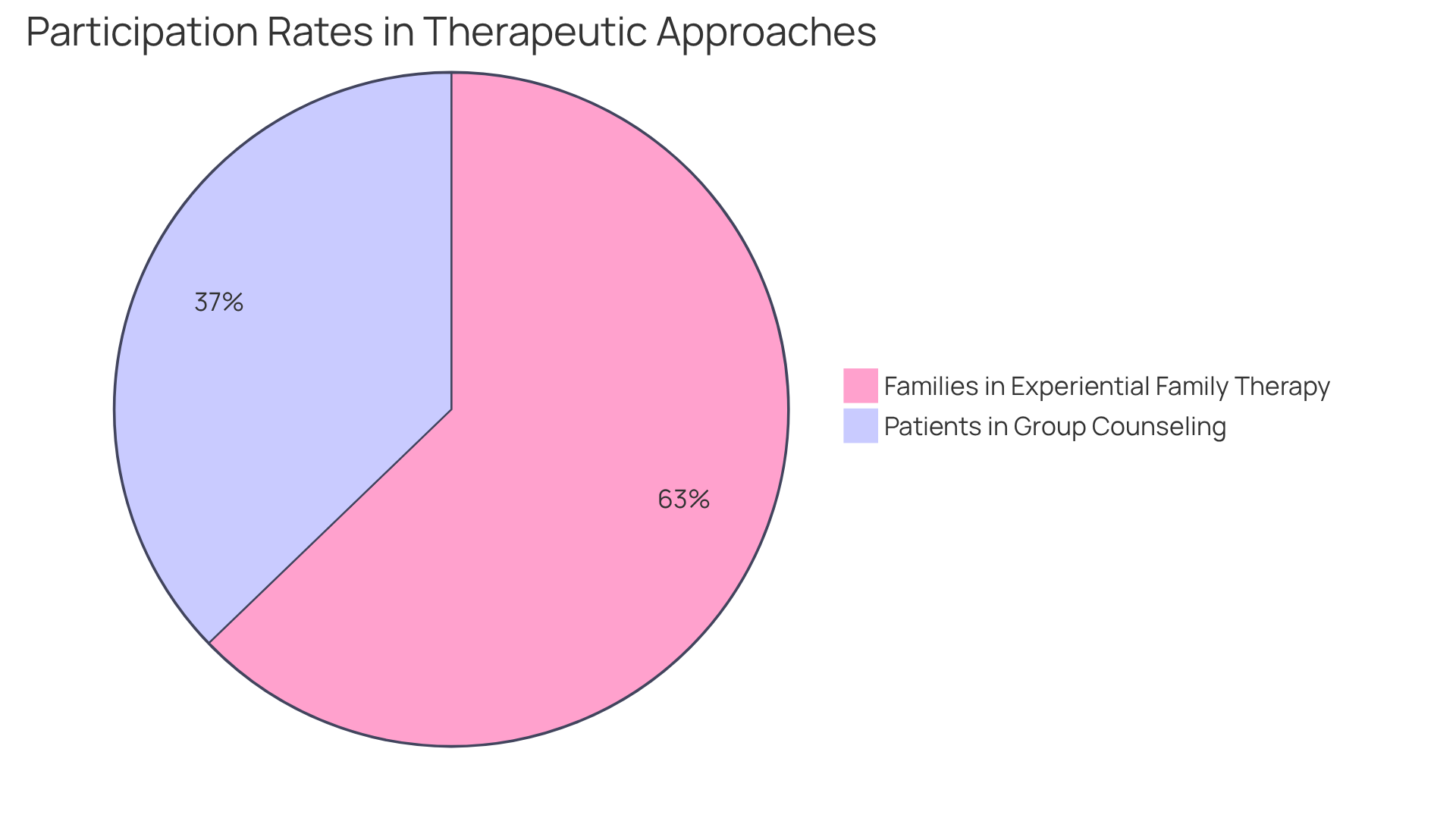Overview
Experiential family therapy is a therapeutic approach that emphasizes emotional expression and interpersonal connections, helping families heal from trauma. Have you ever felt overwhelmed by your past? This approach encourages open communication and deeper understanding among family members, ultimately improving relational dynamics and promoting resilience.
Techniques such as:
- Role-playing
- Art activities
- Mindfulness
foster this healing process, allowing families to connect on a deeper level. As we explore this further, consider how these methods might resonate with your own experiences. Seeking therapy can be a powerful step toward healing and strengthening family bonds.
Introduction
Experiential family therapy emerges as a truly transformative approach in the realm of trauma recovery, focusing on the emotional experiences of family members to nurture healing and connection. Have you ever felt overwhelmed by your past? By engaging in dynamic activities that promote expression and mindfulness, families can gently navigate the complexities of their histories together, paving the way for deeper understanding and trust.
As we explore this further, it's essential to consider how these innovative techniques impact the healing journey. What unique challenges might families face in embracing this method? Reflecting on these questions reveals the profound potential of experiential family therapy in reshaping relationships and facilitating recovery. This journey is not just about overcoming obstacles; it's about fostering a supportive environment where every family member feels valued and understood.
Define Experiential Family Therapy and Its Importance in Trauma Recovery
Experiential family therapy is a compassionate therapeutic approach that emphasizes the feelings of family members as a pathway to healing and understanding. Have you ever felt overwhelmed by your past? This method, rooted in experiential family therapy, encourages families to engage in active, multisensory activities—such as role-playing and art—allowing them to express emotions and interactions that might be difficult to articulate verbally.
Incorporating mindfulness techniques, like meditation, breath awareness, and body scans, can enhance the expression of feelings and self-awareness. Mindfulness invites family members to slow down and observe their thoughts and feelings without judgment, creating a safe space for exploration and connection through present-moment awareness. Its significance in trauma recovery lies in its ability to foster open dialogue and emotional expression, key components of experiential family therapy that help individuals rebuild trust and connection—essential elements for healing from trauma.
At The Emerald Couch, our tailored approach involves collaborative treatment planning, ensuring that each member's unique experiences and needs are addressed throughout the therapeutic process. Together, we can embark on a journey towards healing, where every voice is heard and valued.

Trace the Historical Development of Experiential Family Therapy
Experiential family therapy emerged in the mid-20th century, deeply rooted in humanistic psychology. Pioneers like Virginia Satir and Carl Whitaker were instrumental in shaping this compassionate approach, highlighting the importance of emotional expression and interpersonal connections within families. Have you ever felt the need for deeper connections with your loved ones? Satir's work emphasized authenticity and congruence in family interactions, as reflected in her influential books, including:
- 'Conjoint Family Therapy' (1964)
- 'Peoplemaking' (1972)
- 'The New Peoplemaking' (1988)
She believed that every action conveys a message about self-worth, stating, "Feelings of worth can flourish only in an atmosphere where individual differences are appreciated, mistakes are tolerated, communication is open, and rules are flexible." Whitaker, on the other hand, introduced innovative techniques that encouraged families to participate in experiential family therapy activities, fostering genuine connections and emotional exploration.
As we explore this further, it’s important to recognize how this treatment has evolved over the decades, incorporating insights from various psychological theories and practices. It has established itself as a vital method in relational counseling and trauma recovery. However, Satir's theories have faced criticism for being overly simplistic and lacking empirical support, sparking ongoing discussions about the effectiveness of her methods in addressing complex relational dynamics. Despite these critiques, her contributions, particularly the Satir Growth Model, which emphasizes self-worth and effective communication, continue to resonate in contemporary therapeutic practices.
If you find yourself overwhelmed by past experiences, remember that seeking help is a courageous step towards healing. The journey of understanding and improving your relationships can begin with the insights offered by these pioneering figures in therapy.

Identify Key Techniques and Characteristics of Experiential Family Therapy
Experiential family therapy offers a variety of key techniques that can foster healing and connection. Have you ever felt overwhelmed by your past? Role-playing allows family members to act out situations, providing valuable insights into their dynamics and reactions. Sculpting, on the other hand, involves physically arranging family members to depict their relationships, promoting awareness of the psychological distances and connections that exist. Art-based activities, such as drawing or painting, create a safe space for groups to express emotions that may be difficult to articulate.
Experiential family therapy emphasizes the 'here and now,' encouraging immediate involvement and nurturing a deeper understanding of each family member's experiences and viewpoints. Incorporating art therapy into these techniques opens a unique avenue for emotional release and self-discovery. As therapists assess clients' needs and comfort levels with various media, they guide groups through the art-making process, offering tutorials when necessary.
Following the creative expression, reflection and interpretation take place. This is a time where the therapist assists groups in discussing their artwork and the emotions it evokes, ensuring a non-judgmental space for exploration. This comprehensive approach not only enhances the therapeutic experience but also promotes healing and personal development through experiential family therapy. It can be especially beneficial for individuals who have experienced distress, inviting them to embark on a journey of self-discovery and connection.

Examine Practical Applications and Effectiveness in Trauma Recovery
Experiential family therapy serves as a powerful ally for families navigating the complexities of trauma, especially for overachievers who often find it challenging to prioritize their own needs. This therapeutic approach fosters significant improvements in communication among family members, emotional expression, and relational dynamics. Have you ever felt overwhelmed by your past? Research shows that families dealing with the aftermath of traumatic events can greatly benefit from engaging in experiential family therapy, which allows them to process their experiences together. Such involvement in experiential family therapy not only promotes resilience but also facilitates healing, as case studies indicate that families participating in experiential family therapy report stronger emotional bonds and a deeper understanding of each other's struggles.
However, it's important to note that only 49.3% of patients participated in group counseling, suggesting there may be barriers to involvement. Yet, those who engage in experiential family therapy sessions have demonstrated a remarkable increase in completion rates, with 83.2% for families involved in experiential family therapy compared to 59.2% for those who are not. This underscores the vital role of parental involvement in therapeutic journeys, particularly in recovery situations. Additionally, participation in experiential family therapy is associated with improved treatment outcomes in both telehealth and in-person settings, highlighting its effectiveness across various modalities.
At The Emerald Couch, we understand that each journey is unique. That’s why we offer a free 30-minute consultation to customize our services to your specific needs, ensuring you receive the personalized support essential for navigating trauma, anxiety, and burnout. Together, we can embark on a path towards healing and understanding.

Conclusion
Experiential family therapy emerges as a vital approach in the journey of trauma recovery, emphasizing the importance of emotional expression and interpersonal connections among family members. Have you ever felt overwhelmed by your past? Engaging in active, multisensory activities allows families to navigate their feelings and experiences, fostering healing and understanding. This method not only opens the door for dialogue but also nurtures the essential trust and connection needed for effective recovery from trauma.
As we explore this further, key insights reveal the historical development of experiential family therapy, tracing its roots back to influential figures like Virginia Satir and Carl Whitaker. Their pioneering work laid the foundation for techniques such as role-playing, sculpting, and art-based activities, encouraging families to explore their dynamics and emotions in a supportive environment. Research underscores the effectiveness of this approach, demonstrating significant improvements in communication and emotional bonds among families engaging in experiential therapy, particularly in the aftermath of traumatic events.
Ultimately, the journey towards healing through experiential family therapy is not merely about addressing past wounds; it’s also about fostering deeper connections and resilience within families. In addition to this, as the therapeutic landscape continues to evolve, embracing these innovative techniques can empower individuals and families alike to embark on their paths to recovery. Seeking support through experiential family therapy could be the courageous step needed to transform relationships and enhance emotional well-being. Consider this approach as a crucial option for those navigating the complexities of trauma.
Frequently Asked Questions
What is experiential family therapy?
Experiential family therapy is a compassionate therapeutic approach that emphasizes the feelings of family members as a pathway to healing and understanding, encouraging active, multisensory activities to express emotions and interactions.
How does experiential family therapy help in trauma recovery?
It helps in trauma recovery by fostering open dialogue and emotional expression, which are essential for rebuilding trust and connection among family members, ultimately aiding in the healing process.
What activities are involved in experiential family therapy?
Activities may include role-playing and art, which allow family members to express emotions and interactions that might be difficult to articulate verbally.
What role does mindfulness play in experiential family therapy?
Mindfulness techniques, such as meditation, breath awareness, and body scans, enhance the expression of feelings and self-awareness, creating a safe space for exploration and connection.
How does The Emerald Couch approach experiential family therapy?
The Emerald Couch employs a tailored approach that involves collaborative treatment planning, ensuring each family member's unique experiences and needs are addressed throughout the therapeutic process.




